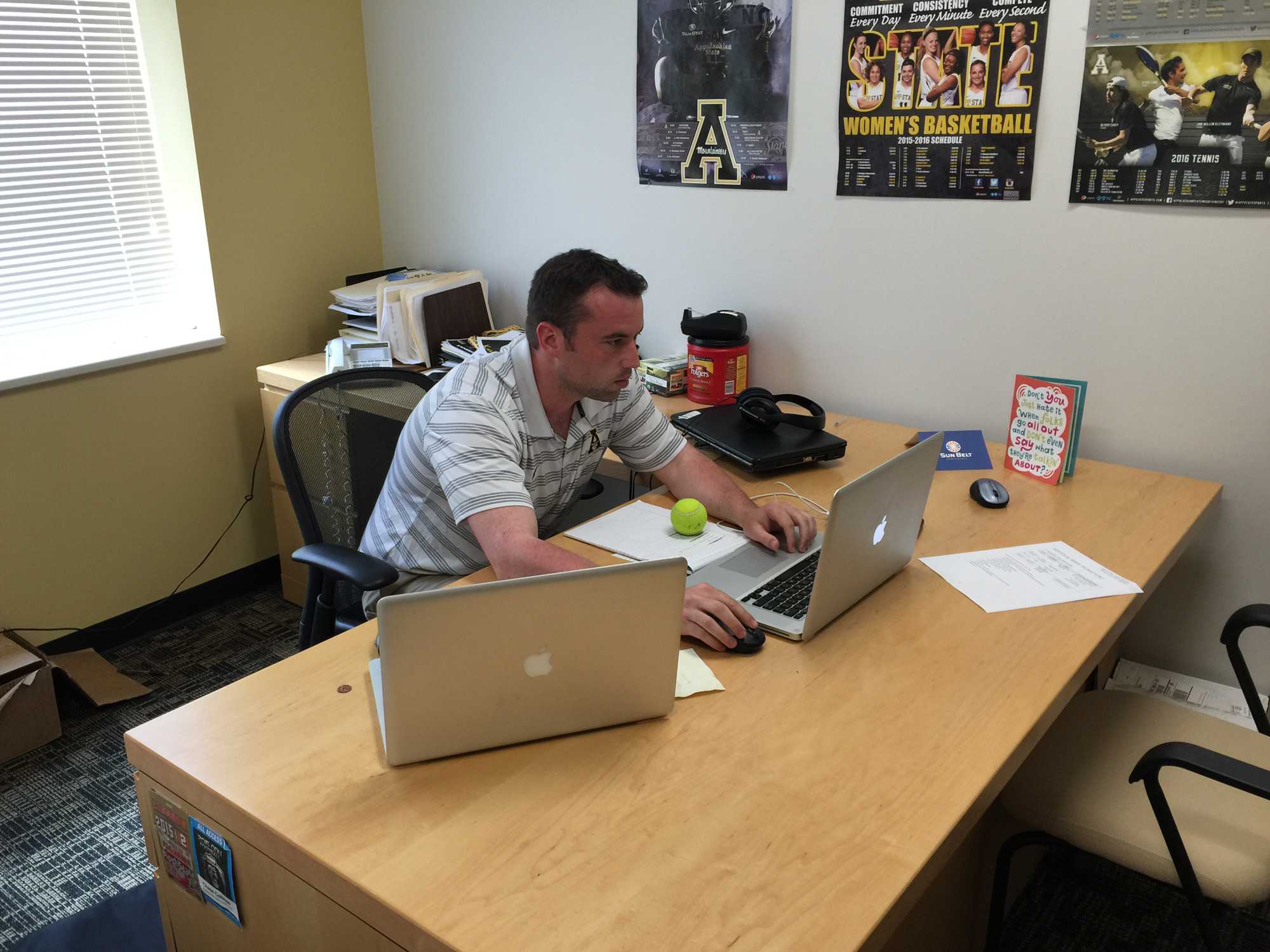Appalachian State University athletics are a major part of the media coverage for news outlets on campus and throughout Boone.
Spot media coverage and advertising are two important aspects of App State sports that go unnoticed. The brains behind the publicity is the Sports Information Department at Appalachian State.
“A lot of it can be really random,” Ben Winterrowd, assistant director of Sports Information, said. “Time management and prioritizing are huge parts of our job.”
Whether it is back to backs, Thursday and Saturday turnaround games, road games, creating game programs while in an airport, events one day or traveling to Alabama the next, these are just a few of the grit and grind the athletic department goes through.
“Sports are so fun, people will say, but they aren’t as glamorous as you think,” Chase Colliton, assistant sports information director, said.
At times, their job responsibilities can be extreme: 70-80 work hours a week. A lot goes into the rigors of their jobs, but Colliton said they do it because they love it.
The traveling can be tough at times, but just this past year they traveled to Texas, Clemson, Alabama and Madison Square Garden.
The Sports Information Department is a major piece of media relations for college athletics. App State’s athletic social media avenues are part of their daily responsibilities and it is their responsibility to coordinate when and where a team or individuals hold interviews and with whom.
Social media is a huge part of the job. For instance, gifs, radio interviews and memes uploaded online are a few more of the responsibilities the Sports Information department has.
A typical day can be very chaotic, arriving at their offices at 8 a.m. and almost immediately having something to work on.
“We’re making sure the opposing teams get our stat files and announcers know exactly how to pronounce the names of each member on the teams,” Colliton said. “We also work with the radio, making sure they have game notes.”
This is just a fraction of the responsibilities they have on game days. They also have to make sure recaps are uploaded within an hour after games, and this goes for all sports. Sometimes college athletics can have four or five different games taking place in one day.
Winterrowd attended the Yosef Club tour recently where fans, alumni and boosters can help the program out by giving donations. One of his memorable moments was at a scheduled stop they had in Raleigh, North Carolina.
“I was on our Yosef club tour where alumni and former student athletes donate. There were a lot of media wanting to talk to [App Football] coach Satterfield and Doug Gillin [App Athletic Director] about where everyone’s at in the football season,” Winterrowd said.
During the station, a chaotic situation happened that surfaces many times throughout their job as an athletics director.
“My boss is feeding me who was going to be there that night and we only had one scheduled [station] that was going to show up and we had another station show up and wanted to do a live on air spot with Doug Gillin,” Winterrowd said. “So within 40 minutes, I had to coordinate and get Gillin over for a live spot, because that’s something that has to be done almost to the second.”
Having only 40 minutes to try and coordinate a live television interview between a local Raleigh news station and Gillin, Winterrowd had to do his best in coordinating the interview.
“It was a little hectic, I mean, he’s walking around talking to people, and I had to go and pull him out and put him on the spot,” Winterrowd said.
Personal relations stands out in the department. Having the responsibility to build a relationship with the coaches, athletic directors, players and knowing when the right time to pull coaches aside for interviews can be a big job.
Understanding when press conferences should wrap up or be kept to minimum is another huge responsibility.
The grind of their job would be game notes. It was a common subject they kept bringing up over and over.
“It’s one thing when a team is winning, you can always have something to write about, but when they lose it’s a lot harder to find something to talk about,” Colliton said.
In the larger picture, understanding that all different sports require game notes to be written beforehand and knowing what to say can be difficult at various times.
The writing and the graphic development part of the job are also extremely important skills for them to know and operate, because being current with present innovations is key to the department’s success.
Currently the sports information department consists of director Mike Flynn, Winterrowd, Colliton and various interns. Every 10 months they hire two interns and accept any volunteer interns interested in furthering their careers.
Next time you check on a game score or look for App State sport updates on the team or school twitter pages and website, make sure you know that the brains behind these stories, updates and scores is the App State Sports Information department who put a lot of hard work in on a daily basis.
Cameron Vaughan, Sports Reporter

